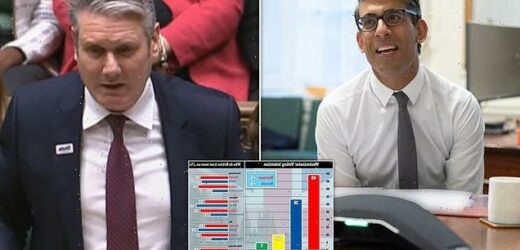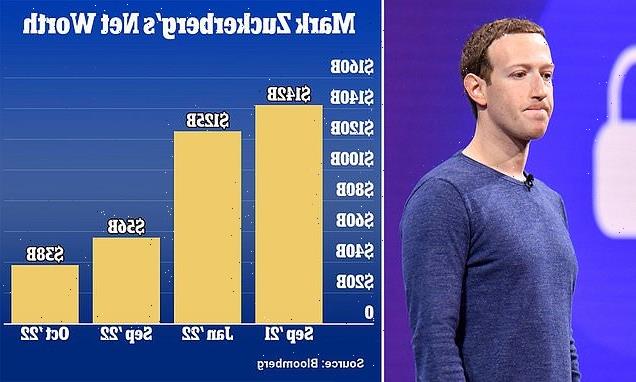Rishi Sunak is more trusted on the economy than Starmer but Tories still lag 23 points behind Labour, new poll finds
- Labour still maintains a 23-point lead in the latest poll over the Conservatives
- Both Rishi Sunak and Sir Keir Starmer have net-positive approval ratings
- The new PM is trusted on the economy and taxes, but Labour lead Tories in both
Rishi Sunak is trusted more than Sir Keir Starmer on the economy and in the role of Prime Minister, new polling has shown, despite the Conservative party stilllagging well behind in the polls.
In what could be seen as a glimmer of hope for the Tories, new figures from BMG suggest that voters trust Rishi Sunak more on the economy, taxes and UK business – but Starmer takes the lead on cost of living and public services.
The polling is the first nationwide picture since Rishi Sunak took over as Prime Minister on Tuesday, and found both leaders had a net-positive rating: a rare occurrence in politics.
But the new figures make good reading for Labour, as the party is more trusted than the Conservatives on cost of living, the economy and taxation.
If a general election were to take place now, Labour would take home 49 percent of the vote, which would equate to a landslide victory and wipe out the majority of Conservative seats.
The Tories are still behind by 23 percentage points on just 26, while the Lib Dems would receive 10 percent and the Greens five percent.
Robert Struthers of BMG told the i: ‘Our headline vote intention numbers make pleasant reading for Labour.
Sir Keir Starmer is more trusted by the public to deal with the cost of living crisis and public services
Rishi Sunak has a net positive approval rating, but faces a huge challenge as the Conservatives remains 23 percentage points behind Labour in the polls
‘A 23-point Labour lead would leave the Conservatives with only around 100 seats if repeated at an election, very much electoral wipeout territory.
‘But Labour should not be complacent. Our polling demonstrates that Rishi Sunak presents a markedly different challenge than that of his predecessor.
‘Given his repeated warnings about the Truss economic agenda during the summer leadership contest, Sunak looks to have largely avoided the damage that has been inflicted on the Conservative Party brand by the disastrous mini-Budget.
He added: ‘Sunak, of course, still faces considerable challenges on multiple fronts, but these numbers should give the Conservatives hope that all is not lost.’
The same polling found that satisfaction with the new Prime Minister as leader of the Conservative Party is in the positive figures – although whether this lasts is difficult to say.
Before former PM Liz Truss resigned last week, her approval ratings had dipped to below that of both Boris Johnson and Jeremy Corbyn at any time in their leadership.
When asked by BMG, 36 percent of people said that Rishi Sunak makes for a better PM than Keir Starmer, but 35 percent thought the opposite.
By comparison, 44 percent of people preferred Starmer to Boris Johnson, who lagged behind on 31 percent, and 53 percent of people preferred him to Liz Truss, who convinced just 10 percent of the electorate she would be a better PM.
The polling, carried out by BMG for the i, showed Starmer retains a lead over Sunak on the cost of living, and the Labour party overall is beating the Conservatives on the issue by 38 percent to 21 percent.
Labour also thrashes the Tories on public trust with the economy and taxes, by 36 to 23 percent and 35 to 22 percent respectively.
This is partly down to the economic and fiscal chaos unleashed under Liz Truss’ unfunded ‘mini-budget’ which sent the pound spiraling to an all-time low.
However, when Sunak and Starmer are pitted against one another directly, Sunak has the trust of 41 percent of the public on the economy, compared to 30 percent for Starmer, and 39 percent for taxation, compared to 30 percent for Labour.
The poll points to the problem that the British public is not convinced by the current political scene, as it also found more than six in ten Britons want an election before the end of December.
Source: Read Full Article





